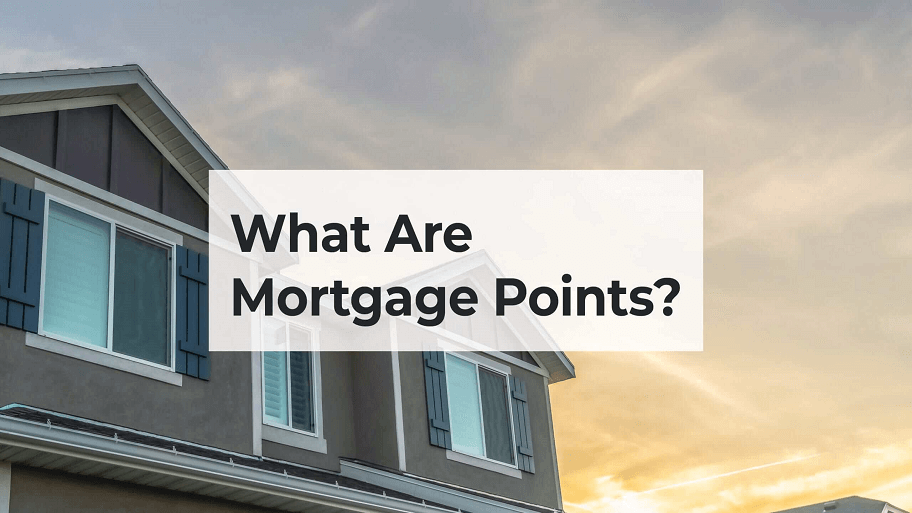You may have come across the concept of purchasing "Mortgage points" while trying to purchase a home or refinance your mortgage.
However, buying mortgage points may not be the best decision in your case. In this article, we will explicitly explore mortgage points, how they work, and whether they are worth the upfront cost. Keep reading to discover whether or not purchasing mortgage points is a smart decision for you.
What Are Mortgage Points?
Mortgage points, also known as discount points, are fees that you pay to your lender at closing in order to lower your interest rate on your mortgage.
Each point typically costs 1% of the total loan amount, and by buying points, you are essentially prepaying some of the interest that you would otherwise pay over the life of the loan.
This can potentially save you a significant amount of money in interest payments over the long run, but it does require an upfront payment.
Discount points VS origination points
Mortgage points that lower your interest rate, aka “discount points”, are different from origination points — another type of mortgage point.
Origination points, on the other hand, are fees that the lender charges to process your loan. These points cover the costs of underwriting, preparing the loan documents, and other administrative expenses.
Origination points are typically not negotiable, and they are usually a percentage of the loan amount. For example, if the lender charges 1.5% origination points on a $250,000 mortgage, you would pay $3,750 in origination fees at closing.
How Do Mortgage Points Work?
Each point typically costs 1% of the total loan amount, and by buying points, you can typically lower your interest rate by 0.25% per point.
For example, let's say you're taking out a $200,000, 30-year fixed-rate mortgage with an interest rate of 4.5%. Without any points, your monthly principal and interest payment would be $1,013.
However, if you decide to purchase two points for a total cost of $4,000, you could lower your interest rate to 4.0%. At this lower rate, your monthly payment would be reduced to $955, saving you $58 per month. Over the course of a 30-year loan, you would save a total of $20,880 in interest payments.
The Benefits of Mortgage Points
Reduce Your Interest Rates and Total Interest Payable
You can reduce your interest rates and total payable interest by buying mortgage points. This can help you shave a notable percentage off your interest payment especially if you plan to keep the property for many years.
For example, suppose you're taking out a $300,000, 30-year fixed-rate mortgage with an interest rate of 4.5%.
Without any points, your total interest payments over the life of the loan would be $247,220. However, if you decide to purchase two points for a total cost of $6,000, you could lower your interest rate to 4.0%. At this lower rate, your total interest payments would be $200,888, saving you a total of $46,332 over the life of the loan.
It May Reduce Your Monthly Payment
Reducing your interest rate by buying mortgage points can also reduce your monthly payments. That way, you can make your payments more comfortably while staying within your budget.
Reduce Payable Tax
Since mortgage points are generally classified under prepaid interest, which is tax deductible, you could reduce income tax by deducting the mortgage point costs from your taxable income.
Note, however, that you may not qualify for the deduction. So, it is better to seek advice from a tax professional to check your qualification and determine the deductible amount.
The Cons of Mortgage Points
Costs of Purchasing Points Are Expensive, Usually 1% Of Your Total Mortgage.
Mortgage points are not cheap, typically costing 1% of the total loan amount per point. This means that on a $300,000 mortgage, one point would cost $3,000, and two points would cost $6,000. This upfront cost can be a barrier for some borrowers, particularly those with limited cash reserves.
Your Closing Cost Increases When You Buy Points.
In addition to the upfront cost of purchasing points, buying points can also increase the amount you pay in closing costs. This is because points are typically paid at closing, along with other fees and charges associated with obtaining a mortgage.
This can make buying points even more expensive and may be a deterrent for some borrowers. It's important to weigh the upfront costs of purchasing points against the potential long-term savings to determine whether it's the right choice for you.
When to Buy Mortgage Points
If you're staying in the home for an extended period: Buying points can be a smart decision if you plan to stay in your home for a long period of time. Doing that can lower your monthly payment, saving a significant amount on interest throughout your loan term.
You are not refinancing soon: If you don't plan to refinance your mortgage in the near future, purchasing points can be a good way to lock in a lower interest rate and save money on interest payments over the life of your loan.
When Not to Buy Mortgage Points
You don't plan to stay in your home for long: If you don't plan to stay in your home for very long, purchasing points may not be worth the upfront cost. It's important to calculate the break-even point to determine whether the savings from the reduced interest rate will outweigh the cost of the points.
You plan to pay extra on your mortgage payments: If you plan to pay above your set monthly mortgage payment, then buying mortgage points may not be necessary.
When you pay extra on your monthly payment, it already helps you to shorten the loan term and reduce the interest rate. If you go on to buy mortgage points, there may not be any notable changes in the total interest rate payable.
You Can't Afford Mortgage Points: You should assess your financial status when deciding whether to purchase points or not. If after checking your budget and capacity you can't afford mortgage points, then it may not be the right option.
Your down payment will be affected: If purchasing points would reduce your down payment below the recommended 20%, it may not be worth the cost. A larger down payment can help you secure a lower interest rate and avoid private mortgage insurance (PMI).
You plan to refinance soon: If you plan to refinance your mortgage in the near future, purchasing points may not be worth the upfront cost. This is because you'll need to pay the upfront cost again when you refinance, and you may not stay in the home long enough to recoup the cost through savings on interest payments.
FAQs
Are Mortgage Points Tax-Deductible?
Yes, in most cases, mortgage points are tax-deductible. However, the rules surrounding mortgage point deductions can be complex, so it's important to consult with a tax professional to determine your eligibility for a deduction.
Can You Negotiate Points on a Mortgage?
Yes, it is possible to negotiate mortgage points with your lender. However, the ability to negotiate may depend on the lender, the type of loan, and your creditworthiness. It's always worth asking your lender if they are willing to negotiate the cost of points.
Is It Wise To Buy Down Rates Against Mortage Interest Rate Increase?
This depends entirely on your personal situation. If you think that the interest rate will increase and you plan on staying in that home for an extended period, then purchasing points may be a smart option. It can help you reduce your rate and total interest throughout the loan term.
However, if you think the interest rate would reduce or you're moving out soon, then buying mortgage points may not do you any good.
Is It Possible To Buy Discount Points After Closing?
No, buying discount points after closing is not allowed. You must have purchased it with the full cost paid during closing. It cannot be paid later to add to the total loan cost.
Can My Home Seller Pay The Discount Points?
While the seller is not obligated to foot the cost for your discount points, they may agree to pay for it. This can help you save extra money on upfront costs and reduce your monthly payment
Note that if the seller agrees to pay your discount points, the negotiation will be included in the purchase agreement.
What is the Break-Even Point and How to Calculate It?
The break-even point is the point at which the cost of purchasing mortgage points is equal to the savings from the reduced interest rate. To calculate the break-even point, you need to divide the cost of the points by the monthly savings on your mortgage payment.
For example, if purchasing points will cost $3,000 and will reduce your monthly mortgage payment by $50, your break-even point will be 60 months or five years. If you plan to stay in your home for longer than the break-even point, purchasing points may be a good investment.
Summary
While mortgage points can be a great way to reduce the interest rate on your mortgage loan and save money over the life of the loan, they may not be the best option for everyone.
To determine whether you can benefit from discount points, it's important to assess your budget, down payment, loan terms, and future plans. By calculating your breakeven point and considering how long you plan to stay in the home, you can determine whether buying mortgage points will save you money in the long run.
Many or all of the products featured here are from our partners who compensate us. This may influence which products we write about and where and how the product appears on a page. However, this does not influence our evaluations. Our opinions are our own. Here is a list of our partners and here’s how we make money.


